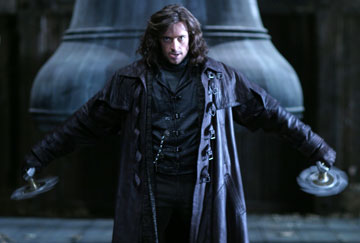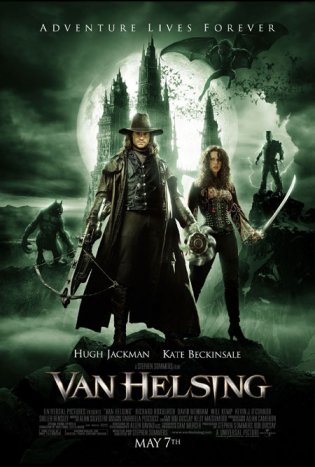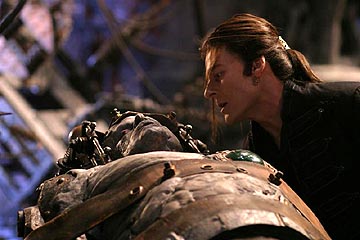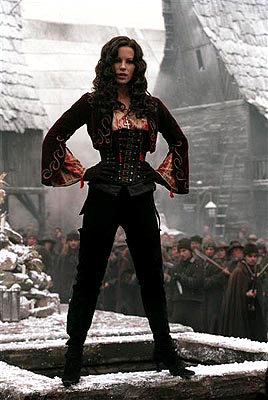If we must give credit to writer/director/sampler Stephen
Sommers, it is for loving too much. Like Quentin Tarantino,
Sommers is clearly a product of the movies he grew up worshipping.
But unlike Tarantino, he learned the wrong lessons from
them. Where some might have seen heart and soul, Sommers
saw make-up that could only be improved by digitization.
It was cool in the thirties to see a vampire turn to dust
through trick photography, so it would be even cooler to
see one melt, writhe, ooze, undulate and perhaps eventually
disintegrate in as slow and vivid a manner as possible.
At some points, these monstrous transformations are like
lava lamps out to suck your blood. Cool it may be, but it's
also very very empty.
The plot of Van Helsing exists only as the barest
of frameworks to hang the effects upon. Many summer box
office hits have been guilty of similar crimes, but this
one seems so tragically close to being actually fun.
Sommers starts things off promisingly enough, by bringing
us into a classic scene from the original Universal Frankenstein.
Or so it seems. Villagers have gathered with their torches
around Castle Frankenstein, while on a distant hilltop we
can see a windmill just aching to catch fire. Even zooming
inside the obviously fake sets doesn't arouse any suspicions
as the handsome Victor Frankenstein (Samuel West) prepares
for his greatest triumph.
No, the first inkling that Van Helsing will go
wrong is in the mincing rock star version of Dracula (Richard
Roxburgh) prancing around. Owing far more to Pete Burns
from Dead Or Alive than to Bela Lugosi, this Dracula has
no introspective side. The vampire lord commits evil acts
for the hell of it, whispering his plans to Victor before
killing him. We don't hear his scheme, but really, it matters
so little and ultimately makes no sense.
What does matter is that Frankenstein's monster (Shuler
Hensley) has the most soul of any character in this film.
He bellows his lines operatically, and later on shows a
great predilection for scripture. At least that guarantees
some dialogue with meaning, even if it is out of context.
And what of the title character, Van Helsing (Hugh Jackman)?
We meet him in Paris, an outlaw hunted by the gendarmes
and dressed somewhere between Robert E. Howard's Solomon
Kane and The Shadow. That won't be the only pulp hero Sommers
shoves into Jackman. After dispatching a "surprise" monster
at Notre Dame, played unrecognizably by Robbie Coltrane,
Van Helsing descends into the bowels of the Vatican (call
it the Vatcave) to be revealed as a holy James Bond, complete
with his own Q. In this case, it's an inventive Friar named
Karl (David Wenham). And just in case you miss the comparison,
Sommers dutifully imitates the introduction of gadget sequences
from many Bond films right down to the off-hand explosive
destruction of a mannequin.
 |
Once things get rolling in Transylvania, viewers have
to turn off their brains if they hope to survive. It's just
one huge action sequence after another, with Van Helsing
being a worse shot than most Bond villain henchmen. At least
these sequences will be absolutely killer in the videogame,
and indeed, they're so dependent on CG that they might as
well actually be the game.
Careening from set piece to set piece, the few quiet seconds
are filled with false monster lore that Sommers forgets
to actually use. Gypsy Anna Valerious (an exceptionally
bosomy Kate Beckinsale) comments that werewolves only shed
under the light of their first full moon, a headscratching
factoid if ever there was one. There's also troubling evidence
that in Transylvania, the full moon seems to come around
every few days. No waxing and waning when there's chaos
to be sown.
At times Van Helsing gets so loud and logic-free
that you long for a soundtrack by Queen or at least Jim
Steinman. The movie may have arrived thirty years too late,
or at least too late for the days when I'd go to movies
in an altered state. It would have fit right alongside rock
fantasias like Phantom of the Paradise or the classic
Rocky Horror Picture Show. More than one scene has
ample opportunity for characters to break into song.
And unfortunately, few people involved in the cast seem
to get that. Beckinsale, though gorgeous, does not seem
to see the humor in her impossibly thick "Transylvanian"
accent. The Brides of Dracula don't see the humor, either,
but make up for it by writhing a lot and sounding strangely
like Arianna Huffington.
Countering them, Roxburgh hardly bothers with a dialect
but at least seems to be having a good time. If anything,
he's not over the top enough.
For the first time, I felt like Jackman was just taking
a paycheck. A great, potentially career-killing paycheck.
He doesn't even bother to hide his Australian accent, a
strange choice for a guy that's supposedly Dutch, taken
in by the Vatican, and then revealed to have darker secrets
that still would take him nowhere near Australia.
Only Wenham, as the reluctant sidekick and Friar, strikes
the right balance. Moreover, it's such a departure from
his role as Faramir in The Lord of the Rings that
it really showcases his versatility as an actor, not to
mention his pretty good comic timing.









